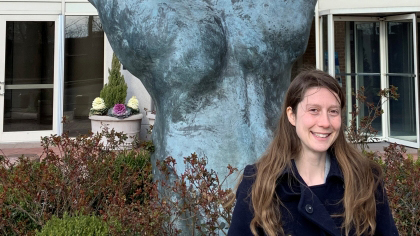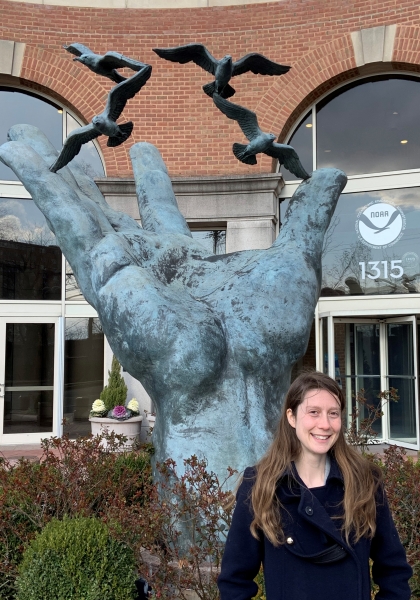Knauss Fellow Profile: Amanda Dwyer


Amanda Dwyer, a 2020 Knauss Fellow, might not be having the typical fellowship experience, due to COVID-19 outbreak and the need to shelter in place, but she’s not letting that stop her work as a Marine Debris Program Specialist, focusing on a new zero waste initiative for National Ocean Service (NOS) offices.
The zero waste initiative recognizes that the trash we produce every day, even if thought to be disposed of properly, can become marine debris. Mismanaged waste, recycling contamination, and the unintentional release of waste during transportation and processing are among the ways trash can make its way into the ocean. Zero waste initiatives focus on reducing the amount of waste produced, often focusing on single-use items, and are an important part of preventing marine debris.
“I was really excited to be matched with the Marine Debris Program, especially because I knew the focus would be the zero waste initiative,” says Dwyer, whose candidacy as a Knauss Fellow was sponsored by Woods Hole Sea Grant. “Coming from a community marine debris perspective, based on the work I did with the Beach Sisters in Lynn, Mass.—a plastic bag ban that they worked on, and a storm drain art project—I really felt like it was a good next step for me to learn about how addressing marine debris works at the government level.”
Through her fellowship, Dwyer has been learning how federal government employees tackle a big problem like marine debris. “I learned the program has regional coordinators in all the different regions to help take on that local aspect,” she says. “They have a science team and a communications team. So as I work on the zero waste initiative, I’m getting to kind of explore what all these different pieces do to come together to create the program.”
As the primary coordinator for the NOS Zero Waste team, Dwyer gets to be involved in all aspects of this initiative. She works with the NOS team reps across different NOS offices to help develop clear messaging about the initiative and actions to all NOS employees. She will be briefing NOS leadership about the progress of this initiative during her fellowship. To continue to improve the zero waste efforts, she meets with partners and other organizations to learn how they are tackling zero waste.
Because the zero waste initiative is just starting out, the team’s immediate focus is on improving the recycling in their building – reducing contamination by training employees and janitorial staff and better communicating what is and is not recyclable. Once the Zero Waste team figures out how to best approach that goal in their building in Silver Spring, they can create a template for teaching others how to go about decreasing waste and contamination in other National Ocean Service or NOAA buildings.
The team has also been working on creating 45 distributable “Zero Waste Kits” to reduce waste at meetings and events. The kits will contain roughly two dozen reusable plates, cloth napkins, mugs, and silverware, and chalkboard nametags and chalkboard markers. “Someday when we’re able to put these kits together and disperse them, there will be one in many NOS offices across the country,” she says.
Though she was only with the Marine Debris Program for six weeks before starting to work remotely, Dwyer says it has been a big, eye-opening, learning opportunity.
“There are so many opportunities for networking and learning. Everything is free and welcoming,” she says of D.C. “So it’s disappointing to be missing that, but I’m just glad that I and everyone I know has so far stayed healthy.”
With most things on hold during the COVID-19 crisis, Dwyer is doing what she can from home, working on putting together resources, so when she returns to D.C., she can hit the ground running.
Dwyer says she is “definitely looking forward” to getting back to the work she is so passionate about—working with others to improve the environment. “We recognize that zero waste isn’t necessarily achievable but you can keep working to get closer and closer and closer to that goal.”
~Stephanie Murphy

About the Knauss Fellowship
The NOAA Dean John A. Knauss Fellowship provides unique professional experiences for graduate students and recent graduate students interested in national ocean policy. Fellows selected for this prestigious program spend a year in the Washington, D.C.-area, working in Congress or the Executive Branch on critical marine policy and resource management issues.
